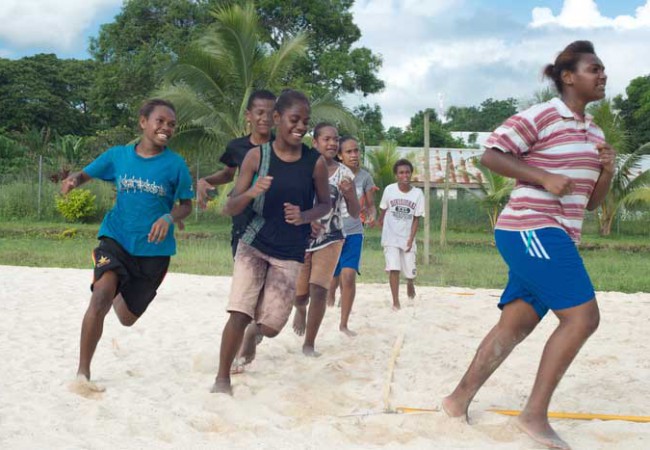
Pacific NGOs need government support
It may seem like an oxymoron to say non-government organizations should receive government funding. But in most Pacific islands, NGOs provide key community-level services yet are notoriously under-funded for the work they do. A key fact exacerbating the difficult financial situation for most NGOs is that foreign donors frequently will provide funding only for activities, but none for employees to carry out the activities.
The contribution to national development, and delivery of health, youth and women’s services by NGOs around the region is obvious and irrefutable. One outstanding example is Wan Smolbag, a theater company in Vanuatu that recently celebrated its 25th anniversary of operations and now, in addition to engaging drama programs, operates health clinics, youth programs and other community services.
Particularly in the smaller islands, though—such as Marshall Islands, Kiribati, Tuvalu, Federated States of Micronesia—there is no corporate funding base for NGOs to gain support. While businesses do contribute to NGOs, these tend to be modest few hundred-dollar donations from time to time. These islands don’t have Ford or Rockefeller Foundations waiting to provide grants to worthy organizations.
NGOs, meanwhile, are driven by vision, motivation and energy—or they wouldn’t exist. These attributes are, sadly, too often missing in government agencies, but fuel NGO work at the grassroots level. It is this very reason why NGOs can do impressive work and provide unmatched services to the community. And the NGOs that have operated for a decade or longer have demonstrated perseverance and, to borrow some jargon from the climate sector, “resilience” in the face of overwhelming funding challenges and odds against their continuing as going concerns. Donors repeatedly flip-flop between directly funding NGOs or channeling grants through government departments as the grant brokers, adding another layer of bureaucracy—and difficulty—for NGOs to overcome. Or international donors stop funding accomplished NGOs altogether, saying they should replace their donor aid with domestic funding. The big question, particularly for small islands, is: are there any non-government sources for core operations funding? NGOs need funding to pay staff to deliver programs, but where can they find it at home?
The irony and the impact of the vagaries of donor funding is not lost on the NGO community. Take, for example, the case of an experienced NGO outreach health worker in the Marshall Islands, whose salary was funded by donors. The staff person was dispatched to Fiji for an accredited six-month training course to upgrade her community organizing skills. When she returned to Majuro to work, she discovered funding for her salary had been eliminated by the donor agency and, despite her higher qualification and skill levels, the NGO was unable to find alternative funding. Ultimately, this skilled and experienced outreach worker migrated to the United States for work.
In the Marshall Islands, which like many island nations has an active if small NGO sector, NGOs provide a variety of skills trainings ranging from carpentry and canoe building to handicraft making and sewing, address children and youth health needs, and promote gender equality and domestic violence prevention. These areas are best served by NGOs and, in fact, are meeting important needs to which the government would otherwise have to respond. Even though government agencies such as Public Works run an occasional skills training programs and the College of the Marshall Islands offers ongoing vocational education programs, the NGOs incorporate life skills into their training programs that often make the difference between success and failure in the workplace and life in general. Waan Aelon in Majel (Canoes of the Marshall Islands), Juren Ae (loosely translated as calming or controlling the ocean current), and Youth to Youth in Health all incorporate alcohol and substance abuse counseling and numerous other life skills to make it possible for trainees who dropped out of school at an early age to successfully re-engage as productive members of their communities. In light of increasingly severe poverty in urban centers throughout the Pacific and the lack of opportunity for under-educated individuals, these NGOs are providing essential services for their islands.
But the challenge for many NGOs in the Marshall Islands and elsewhere is finding money to pay skilled staff to manage community programs. Frequently, the few paid staff in an organization end up spending most of their time chasing grants just to keep a handful of core staff on the payroll and end up with little time for program work.
Palau has established an innovative way to locally finance conservation work at the community level by devoting a portion of its high departure tax to fund conservation. Over a million dollars a year is generated to support marine and coastal conservation programs, money that can be leveraged to meet matching grants of donors.
There is no question that in the smaller islands, local communities would benefit from governments setting aside specific funding for core NGO staff—funding, for example, for a director, program manager and accountant or grants manager—that would ensure established NGOs providing community services don’t disappear for lack of financing. Provision of funding for three core staff persons would give them the freedom to focus on generating grants to fund other staff and program activities. In the eight Parties to the Nauru Agreement (PNA) nations, fisheries revenue has quadrupled in recent years and is set to rise again in 2015. Setting aside $300,000 or so a year from fisheries funds to support established local NGOs—a drop in the bucket in fisheries revenue and annual budgets of most island nations—would go a long way to stabilize NGOs and ensure they are able to maintain and expand services needed by their communities. Regardless of where money comes from, targeted minimum government support of domestic NGOs will bolster the sector and encourage outside donors to match the local funding available, allowing for further expansion of health, education, business and other initiatives by NGOs.

